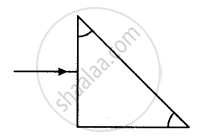Advertisements
Advertisements
Questions
The phenomena of light involved in the formation of rainbow are ______.
Which of the following phenomena of light are involved in the formation of a rainbow?
Options
Reflection, refraction and dispersion
Refraction, dispersion and total internal reflection
Refraction, dispersion and internal reflection
Dispersion, scattering and total internal reflection
Solution
Refraction, dispersion and internal reflection
Explanation -
A rainbow is a natural spectrum of seven colours appearing in the sky after a rain shower. It is caused by dispersion of sunlight by tiny water droplets, present in the atmosphere. The water droplets act like small prisms. They refract and disperse the incident sunlight, then reflect it internally, and finally refract it again when it comes out of the raindrop.
RELATED QUESTIONS
State the cause of dispersion of white light passing through a glass prism. How did Newton show that white light of sun contains seven colours using two identical glass prisms. Draw a ray diagram to show the path of light when two identical glass prisms are arranged together in inverted position with respect to each other and a narrow beam of white light is allowed to fall obliquely on one of the focus of the first prism.
Make two diagrams to explain refraction and dispersion.
How could you show that the colours of the spectrum combine to give white light?
When white light passes through a prism, it ............
Which is optically denser: water or air? Give reason
- A beam of monochromatic light undergoes minimum deviation through an equiangular prism, how does the beam pass through the prism, with respect to its base?
- If white light is used in the same way as in part (a) above, what change do you expect in the emergent beam?
- What conclusion do you draw about the nature of white light in part (b)?
In the diagram, a narrow beam of white light is incident on a right-angled isosceles prism. The critical angle of the material of prism for the yellow colour of white light is 45°. Complete the diagram to show the path of blue, yellow, and red colours of white light till they emerge out of the prism.

The splitting of white light in to seven colors is called ______.
The sunlight can be split into its constituent colors using ______.
Why do we see a rainbow in the sky only after rainfall?
